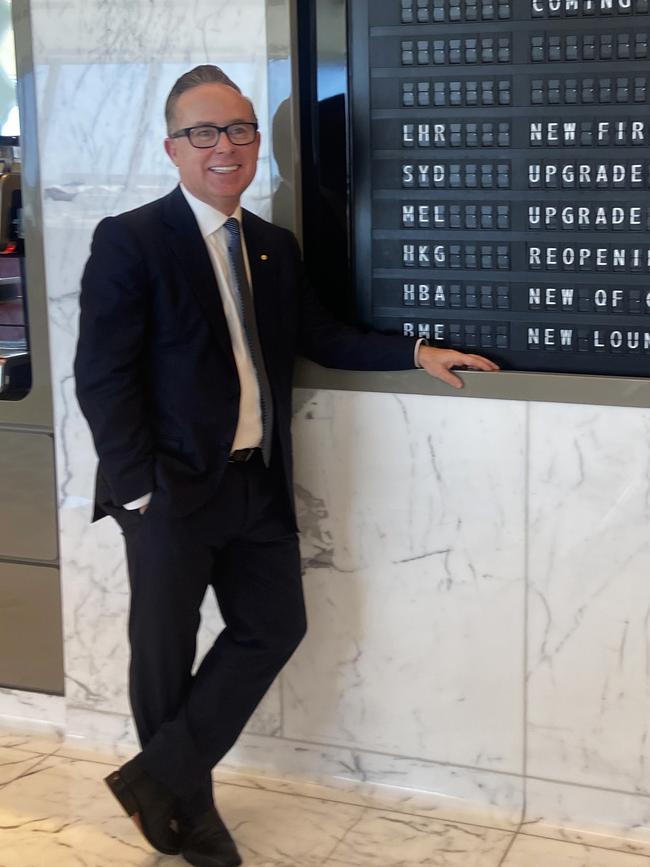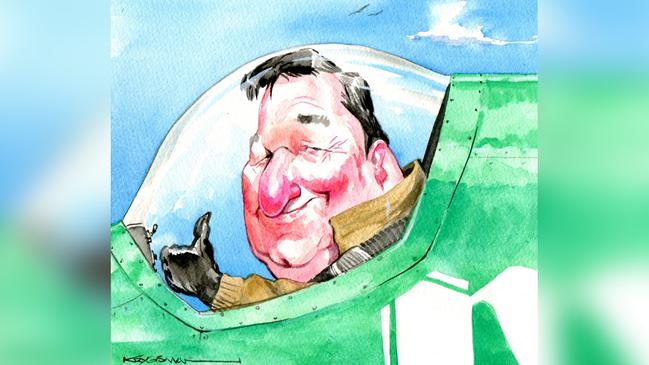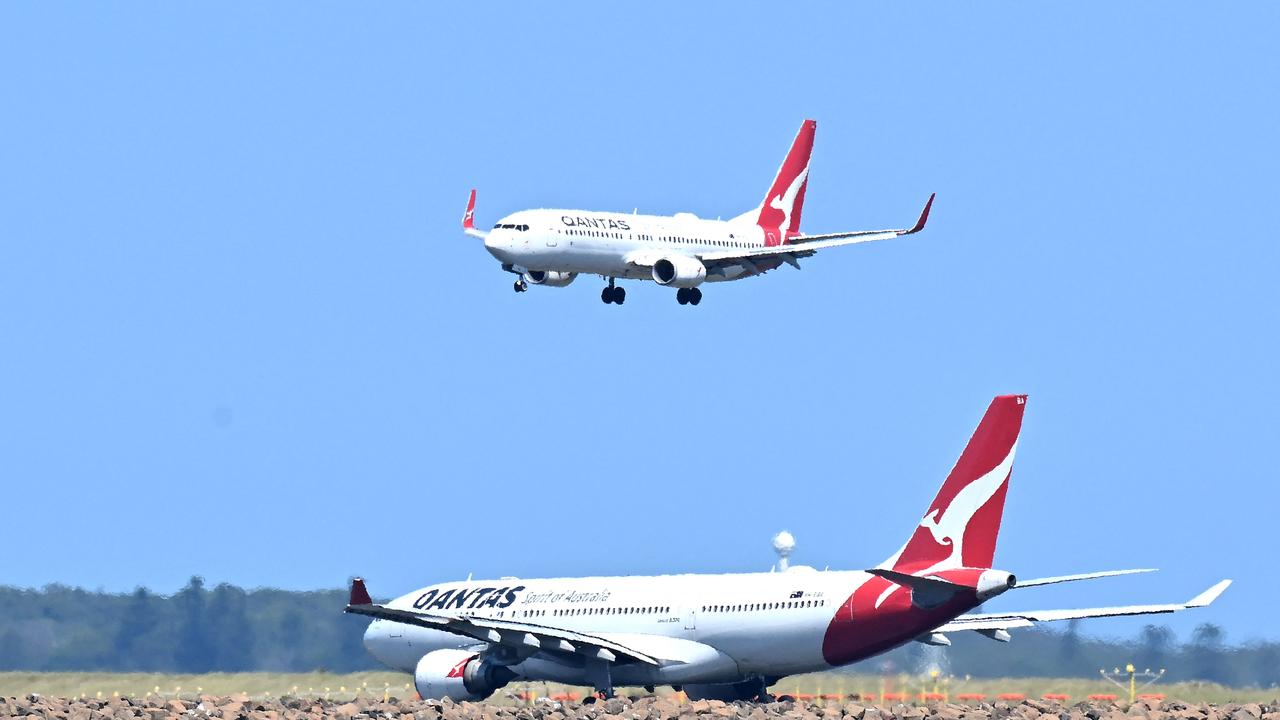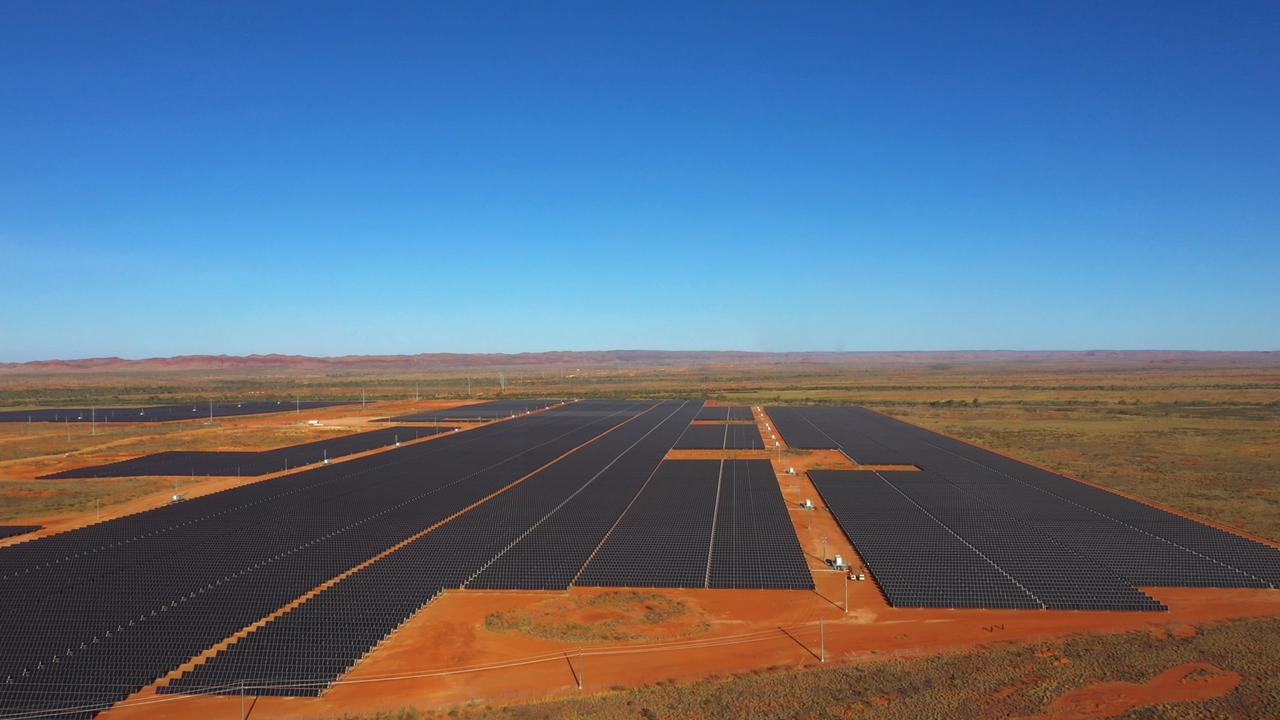
Domestic profit margins in the latest half stood at 21 per cent compared to 14 per cent pre-Covid lockdowns. Look no further for an explanation of how managing supply in a market with strong demand boost profits.
Since its last earnings release in October, Qantas’ stock price has outperformed the market by 35 per cent, which also explains why – even with record profits – with a distinct lack of forward guidance the stock was sold off on Thursday.
Like CBA, the market thinks this is as good as it gets for a while.
The stellar Qantas and Transurban results this half were a minority in what has frankly been a disappointing profit season with future earnings being downgraded as a result.
Revenue was not the problem in the half which benchmarked the 2021 lockdowns in NSW and Victoria but costs increased sometimes faster than sales. With demand expected to slow this is what the strategists call negative jaws.

Earnings per share of 7.3 per cent this year is expected to slump to just 0.3 per cent on consensus forecasts.
The evidence of an economic slowdown is quantifiable and comes ahead of the April bank cliff when some 880,000 mortgages valued at $350bn switch from fixed to variable.
In all 20 per cent of mortgages will be reset resulting in significantly increased mortgage costs and less money to spend.
Most metrics showed improved profits and dividends but both increases were below average. Upside profit surprises were 29 per cent against 43 per cent historically on AMP’s Shane Oliver’s figures, and downside surprises were higher than usual. Some 57 per cent of profits rose last half but down against an average of 64 per cent in past seasons. Likewise dividends were up 54 per cent against an historical average of 58 per cent and positive surprises we’re just 29 per cent against an average of 43 per cent.
The market reaction to disappointing results was severe showing traders’ minds have already changed.
Since earnings season started the S&P 200 has fallen 2.25 per cent but is still up 3.5 per cent for the year.
Joyce didn’t waste the crisis, slashing staff numbers by 10,000 and fixed costs by $1bn while also collecting around $2.2bn in taxpayer money from JobSeeker to freight payments to returning repatriated citizens.
To be fair much of the government money was cost recovery.
Qantas posted $7bn in Covid-19 losses when the government forced it to shut down which means on present estimates it will take until the 2025 financial year before franked dividends are paid.
That is another way of saying the company doesn’t plan on paying any taxes any time soon.
No problem, Joyce used some of the funds for $900m in share buybacks announced over the last year.
Well aware of his different stakeholders Joyce will shortly make some noise about his own plans to invest more in skills training to offset all the talent shown the door in the lockdown.
Fuelling our air travel
Next week, Transport Minister Catherine King will use the Avalon Air Show at Geelong to host a sustainable aviation fuel (SAF) roundtable.
The recovery and push for renewable energy faces massive competition from the US and Europe, with the former’s $US500bn Inflation Reduction Act certain to divert investment funds to the US.
This means a concerted push is needed from both government and industry which King’s initiative shows she understands.
Qantas has created an SAF coalition which includes Woodside, which has the same chair in Richard Goyder, KPMG, Macquarie, BCG and Australia Post which is so far more a commitment to buy offsets to counter company-driven fuel miles.
Last year the Queensland government announced a $500m renewable diesel and SAF plant to be built in Gladstone. Once completed, the plant is expected to produce 350 million litres of SAF and renewable diesel per year from feedstock such as tallow, canola and used cooking oil.
Greg Hunt at Nufam is a step ahead on the same campaign, having signed a 190-year offtake agreement with BP, which this week unveiled plans to use its old Kwinana oil terminal to supply sustainable aviation fuel using crushed carinata seed oil.
As a global player, Nufarm has chosen to work with big oil as the best outlet for its alternate fuel.

Carinata is a non-food oil seed cover crop growing between primary crop rotations, which means it does not get in the way of actual food production and, better, generates carbon in the soil. The oil has been qualified as a feedstock for biojet fuel and is also used for renewable diesel production.
In 2021 the global aviation industry used 57 billion gallons of fossil-based jet fuel and by converting from fossil-based fuel to SAF would reduce greenhouse gas emissions by 80 per cent.
Carinata could grow enough feedstock for a billion gallons of SAF production annually from 2030. Under conservative modelling, this will remove 8 million tonnes of carbon dioxide per year. This equates to over 2 million tonnes of actual carbon.
The crop growing first in Argentina has had its first shipment to Saipol in France to supply BP.
Next step for Hunt is to roll out carinata in Australia and other markets. The big advantage in the crop is it is part of the food production cycle so it’s not a question of diverting sugar cane to use in aviation fuel.
Hunt will shortly also formally unveil his long awaited omega three canola oil tablets for human consumption in the US, making it the first land-based source of omega three.
Early output has been used to supplement feed for fish farms.
It’s all a long way from your grandfather’s Nufarm and sets the company for a sustainable future.
Territory taking off
Northern Territory Deputy Chief Minister Nicole Manison completed a roadshow in Sydney and Melbourne this week with adviser Tanarra’s John Wylie promoting a range of local start-ups.
Tourism is a key economic engine for the region but Manison’s message was that most of the key market investment themes are covered by Territory companies.
The talent on show included Amphibian Aerospace which has teamed up with Pratt & Whitney and others to make specialist sea planes the G111 Albatross.
Avenira has partnered with a Taiwan firm to establish Australia’s first battery cathode plant at Tennant Creek.
Equatorial Launch Australia is a commercial space launch company fresh from launching three rockets for NASA last year.
SPEE3D with offices in Australia and the US is dedicated to the development and delivery of metal 3D printers and integrated systems using its patented cold-spray technology. Its clients cover the AUKUS alliance members.
Perth-based Tivan Resources manages the Speewah vanadium-titanium-iron project south of Wyndam and is Australia’s largest and highest quality titanomagnetite resource. The resource is used for cast iron steel and salt production.
Another on the list is Verdant Minerals which is developing the Ammaroo ammonium phosphate fertiliser project.
The roadshow is part of the NT’s efforts to boost its potential following the Territory Economic Commission report three years ago, which said the government had to move from just making it easier to invest in the region to actually promoting and selling it.




If Transurban’s Scott Charlton milks monopoly power better than anyone in the Australian market, no one can match Qantas’s Alan Joyce in exploiting his sheer market power.